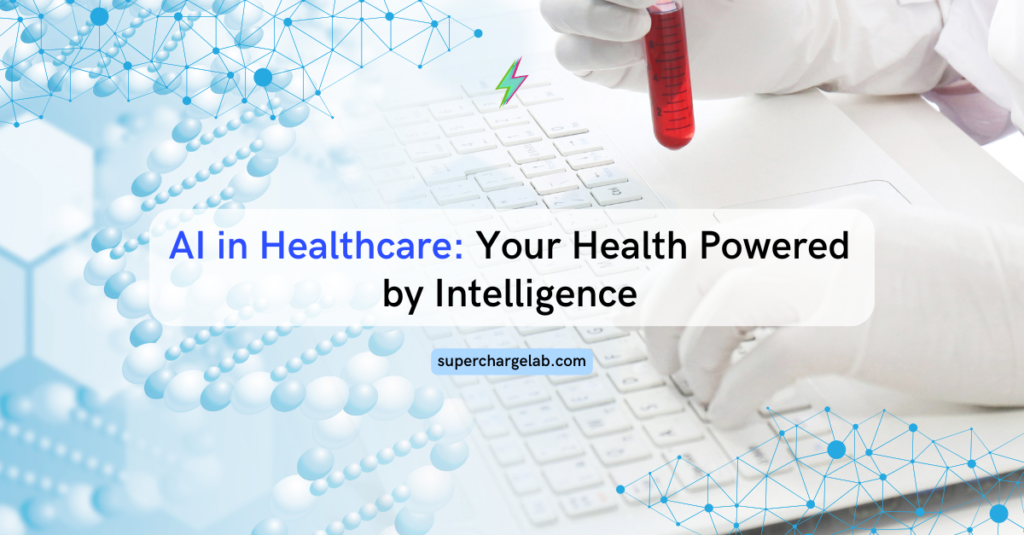
Imagine a doctor who can diagnose your illness with incredible accuracy, even before you feel sick. Or you are having your health monitored around the clock, catching potential problems before they become serious. This is the future of healthcare, and artificial intelligence (AI) is making it happen right now.
Healthcare is a big and complex system. It’s made up of hospitals, clinics, insurance companies, drug companies, a whole host of vendors, suppliers, and medical technologists, and a lot of rules and regulations. This complexity can sometimes lead to high costs, long wait times, and not everyone getting the care they need. New technologies can help, but it’s not always easy to make them work with the old ways of doing things.
This is where AI steps in. AI doesn’t replace medical professionals – but it does grant them some superpowers. Technology can help doctors make better diagnoses, predict health problems before they happen, and even help formulate more effective pharmaceuticals. It’s like having a team of experts working behind the scenes to keep you healthy.
- The Game-Changer in Healthcare:
AI is stepping in to tackle these challenges head-on. AI is about giving them powerful tools to provide better care for their patients. Here’s how:
- AI-Powered Diagnostics: One of the most exciting applications of AI in healthcare is in diagnostics. AI algorithms can analyze medical images like X-rays, CT scans, and MRIs with incredible speed and accuracy, often outperforming human radiologists. This means faster and more accurate diagnoses, leading to earlier treatment and better outcomes for patients. For example, AI is being used to detect early signs of cancer, Alzheimer’s disease, and diabetic retinopathy.
- Virtual Health Assistants: AI-powered chatbots and virtual assistants are transforming how patients interact with healthcare providers. They can answer questions, schedule appointments, and even provide basic medical advice, freeing up doctors and nurses to focus on more complex tasks. This is particularly beneficial for patients in remote areas or those with limited mobility who may not have easy access to healthcare facilities.
- Personalized Medicine: AI is paving the way for personalized medicine, where treatments are tailored to each individual’s unique genetic makeup and health history. AI analyzes vast amounts of data, enabling it to identify patterns and predict how patients will respond to different treatments. This leads to more effective therapies and fewer side effects for patients.
- Drug Discovery: AI is accelerating the drug discovery process, which traditionally takes years and billions of dollars. AI algorithms can analyze massive datasets of molecular structures and biological data to identify promising drug candidates, significantly shortening the time it takes to bring new treatments to market.
- Driving Forces Behind AI in Healthcare
The use of AI in healthcare is growing quickly for a few reasons. New technology, like better AI, smarter computers, and the ability to look at lots of information, has made it possible to create helpful tools that we couldn’t even imagine before. At the same time, we have perhaps the richest health dataset ever amassed, thanks to digital medical records and wearable devices like smartwatches. This information helps AI get even smarter. Plus, people want better healthcare that’s more personal, easier to access, and not too expensive. AI-powered solutions can do much of these things, which is why they’re becoming so popular. - Challenges and Considerations
While AI offers a wealth of potential benefits for healthcare, it’s important to acknowledge and address the challenges that come with its adoption.
- Data Privacy and Security:
One of the most pressing concerns is the privacy and security of sensitive patient data. As AI systems increasingly rely on large amounts of personal health information, it’s crucial to implement robust security measures to protect this data from unauthorized access, breaches, and misuse. This involves strong encryption, strict access controls, and regular audits to ensure compliance with data protection regulations.
- Ethical Considerations:
As AI plays a more significant role in healthcare decision-making, ethical questions arise regarding accountability and transparency. When AI algorithms are used to diagnose diseases or recommend treatments, who is responsible if something goes wrong? How can we ensure that these algorithms are transparent and explainable, so that doctors and patients understand the reasoning behind their decisions? Additionally, there’s the concern of potential biases in AI algorithms, which could lead to disparities in care based on race, gender, or socioeconomic status. Addressing these ethical considerations requires ongoing dialogue and collaboration among healthcare professionals, AI researchers, and policymakers.
- Integration Challenges:
Integrating AI technologies into existing and frequently fragmented legacy healthcare systems is not always a smooth process. Legacy systems may not be compatible with new AI tools, and healthcare providers may need to invest in additional infrastructure and training to fully leverage the benefits of AI. The cost of implementation can also be a barrier, especially for smaller healthcare organizations with limited resources.
Overall, while AI has the potential to revolutionize healthcare, it’s essential to approach its implementation with a thoughtful and responsible approach that prioritizes patient safety, privacy, and equity
- Conclusion:
AI is future of healthcare and it’s the present. It’s already transforming how we diagnose and treat diseases, how we manage our health, and how we discover new therapies. While challenges remain, the potential benefits of AI in healthcare are undeniable. It has the power to improve the quality of care, increase efficiency, and make healthcare more accessible to people worldwide. https://calendly.com/superchargelab